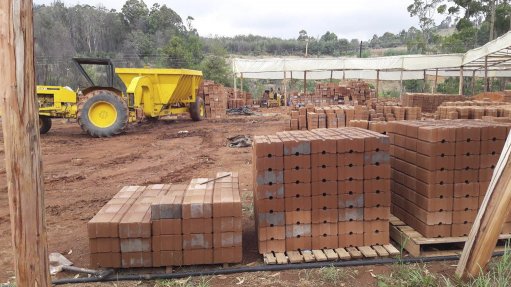
EASY PRODUCTION The machines can produce new blocks within 14 seconds
Independent school for boys and girls Knowstics Academy, in Manicaland, Zimbabwe, bought three block-production machines in June last year from machine manufacturer Hydraform, of Boksburg, South Africa, to start construction on new premises that will have separate buildings for boys and girls.
The academy bought the M7MI Super machine at the start of the project, later buying the M7S2E and the M7S1E block- producing machines to produce brick blocks, used for building construction, from natural material acquired from the surrounding area, says Hydraform sales executive Edward Tashayawedu.
As the academy aims to complete the project in June, the equipment provided by Hydraform has to produce brick blocks of various sizes using only 10% cement and soil. He points out that the academy uses the soil that has been excavated from the building site.
The new buildings, comprising laboratories, classrooms and an administration building, will accommodate 600 learners.
The initial creation of each block from each machine takes between 11 and 14 seconds, with each machine requiring only a few hours to set up, Tashayawedu says. Thereafter, the blocks are subjected to a wet-curing and a dry-curing process, with each process taking seven days, after which construction can start, he explains.
After the first seven days of wet curing, the strength of each block will be in the range of 3 Mpa to 5 Mpa, but, once the blocks have been completely cured, each will have a minimum strength of 7 Mpa. Tashayawedu points out that the curing process takes place without the use of an oven.
“One of the main advantages of the M7MI Super machine . . . is that it has its own diesel engine,” says Hydraform sales and marketing director Nazile Dickson, adding that the trailer on which the machine is mounted allows for the machine to become a mobile manufacturing plant.
“We sent out a trainer who spent two weeks on site in Zimbabwe after the M7MI Super was bought at the start of the project,” he highlights, outlining that the construction team was trained in the correct procedure for block production and block curing, as well as the basic construction principles.
Hydraform also has an after-service department that regularly contacts clients to ensure that the machines are functioning properly. Basic maintenance on each Hydraform machine is done on site.
Tashayawedu clarifies that, if there are major breakdowns on any machines supplied by the company, they can be repaired within 24 hours. Photographs taken of the machines on site enable the company to assist clients or Hydraform liaises with a diesel mechanic who is on site – hired by the project owners – to repair the machine remotely, he adds.
He emphasises that the total value of the equipment bought from Hydraform for the project is more than R1-million.
“When the project started last year, there were only 50 people constructing the new buildings. When I recently talked to the client, there were more than 200 people helping to produce new blocks and build the new buildings required for the academy, Tashayawedu concludes.